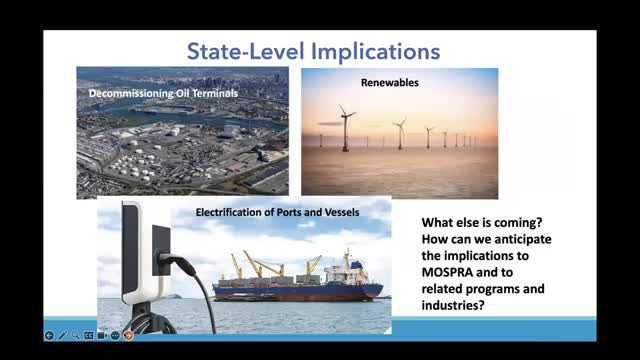MASPA explores strategic foresight for future energy and port developments
December 05, 2024 | Massachusetts Department of Environmental Protection, Executive , Massachusetts
This article was created by AI summarizing key points discussed. AI makes mistakes, so for full details and context, please refer to the video of the full meeting. Please report any errors so we can fix them. Report an error »

In a room filled with the soft buzz of anticipation, members of the BWSC Oil Spill Act Advisory Committee gathered on December 5, 2024, to discuss the evolving landscape of oil management and environmental sustainability in Massachusetts. The meeting, hosted by the Massachusetts Department of Environmental Protection (MassDEP), served as a platform for critical conversations about the future of energy and its intersection with environmental policies.
As the discussions unfolded, a notable theme emerged: the ongoing transition from traditional oil practices to more sustainable alternatives. Committee members highlighted significant changes already taking place, such as the decommissioning of oil terminals in Boston and the rise of offshore wind energy projects. These developments signal a shift towards cleaner energy sources, reflecting a broader commitment to reducing the state's carbon footprint.
The conversation also touched on the electrification of ports and vessels, a trend that promises to enhance efficiency and minimize environmental impact. This shift is not merely a local initiative; it aligns with the Massachusetts State Pier Authority's (MASPA) efforts to support both municipal and private sector programs aimed at fostering sustainable practices.
Strategic foresight emerged as a key methodology in the discussions, encouraging participants to anticipate future challenges and opportunities in the energy sector. This approach, rooted in military strategy, aims to prepare stakeholders for the complexities of transitioning to a more sustainable energy framework.
As the meeting progressed, the committee members recognized the importance of collaboration among various sectors, including government partners and private industries. By working together, they hope to create a cohesive strategy that not only addresses current environmental concerns but also paves the way for a greener future.
The implications of these discussions extend beyond the meeting room. As Massachusetts continues to navigate its energy transition, the decisions made today will shape the state's environmental landscape for years to come. The commitment to sustainability and innovation is clear, and the path forward is one that will require ongoing dialogue and collaboration among all stakeholders involved.
As the discussions unfolded, a notable theme emerged: the ongoing transition from traditional oil practices to more sustainable alternatives. Committee members highlighted significant changes already taking place, such as the decommissioning of oil terminals in Boston and the rise of offshore wind energy projects. These developments signal a shift towards cleaner energy sources, reflecting a broader commitment to reducing the state's carbon footprint.
The conversation also touched on the electrification of ports and vessels, a trend that promises to enhance efficiency and minimize environmental impact. This shift is not merely a local initiative; it aligns with the Massachusetts State Pier Authority's (MASPA) efforts to support both municipal and private sector programs aimed at fostering sustainable practices.
Strategic foresight emerged as a key methodology in the discussions, encouraging participants to anticipate future challenges and opportunities in the energy sector. This approach, rooted in military strategy, aims to prepare stakeholders for the complexities of transitioning to a more sustainable energy framework.
As the meeting progressed, the committee members recognized the importance of collaboration among various sectors, including government partners and private industries. By working together, they hope to create a cohesive strategy that not only addresses current environmental concerns but also paves the way for a greener future.
The implications of these discussions extend beyond the meeting room. As Massachusetts continues to navigate its energy transition, the decisions made today will shape the state's environmental landscape for years to come. The commitment to sustainability and innovation is clear, and the path forward is one that will require ongoing dialogue and collaboration among all stakeholders involved.
View the Full Meeting & All Its Details
This article offers just a summary. Unlock complete video, transcripts, and insights as a Founder Member.
✓
Watch full, unedited meeting videos
✓
Search every word spoken in unlimited transcripts
✓
AI summaries & real-time alerts (all government levels)
✓
Permanent access to expanding government content
30-day money-back guarantee

